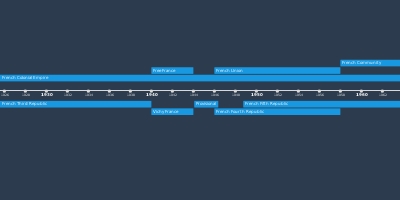1 Feb 1787 Jahr - Assembly of Notables
Beschreibung:
The final appearance of the Assembly of Notables began in February 1787 during Louis XVI's reign, during which France’s finances were in a desperate situation and the finance ministers of the day (Turgot, Necker, Calonne) all believed that tax reform was necessary if France was going to pay off its debt and bring government expenditure back into line with government income. However, before any new tax laws could be passed, they first had to be registered with the French parlements (which were high courts, not legislatures, but that possessed a limited veto power on new laws).Repeated attempts to implement tax reform failed due to lack of parlement support, as parlement judges felt that any increase in tax would have a direct negative effect on their own income. In response to this opposition, the finance minister at the time, Calonne, suggested that Louis XVI call an Assembly of Notables. While the Assembly of Notables had no legislative power in its own right, Calonne hoped that if the Assembly of Notables could be made to support the proposed reforms then this would apply pressure on parlement to register them.
Calonne proposed four major reforms:
a single land-value tax
the conversion of the corvée into a money tax
the abolition of internal tariffs
the creation of elected provincial assemblies
In the traditional view, the plan failed because the 144 assemblymen, who included princes of the blood, archbishops, noblemen and other people from the traditional elite, did not wish to bear the burden of increased taxation.
However, Simon Schama has argued that the notables in fact were quite open to radical political changes; for example, some proposed the elimination of all the tax exemptions conferred by noble status; others proposed lowering the income qualifications for voting for members of the proposed provincial assemblies. Schama wrote:
Yet what was truly astonishing about the debates of the Assembly is that they were marked by a conspicuous acceptance of principles like fiscal equality that even a few years before would have been unthinkable....Where disagreement occurred, it was not because Calonne had shocked the Notables with his announcement of a new fiscal and political world; it was either because he had not gone far enough or because they disliked the operational methods built into the program.
In addition, the Assembly insisted that the proposed reforms should actually be presented to a representative body such as the Estates-General.
Opposition in the Assembly combined with intrigues from rival ministers led to Calonne's disgrace and he was subsequently dismissed by Louis XVI on 8 April 1787. In addition to tax reform, the Assembly also discussed other issues. The result was that the Assembly assisted the Parliament in creating provincial assemblies, reestablished free trade in grain, converted the corvée (a feudal duty in the form of forced labour) into a cash payment, and generated short-term loans.
Calonne's successor, Loménie de Brienne, dissolved the body on 25 May.
Zugefügt zum Band der Zeit:
Datum:
1 Feb 1787 Jahr
Jetzt
~ 238 years ago
